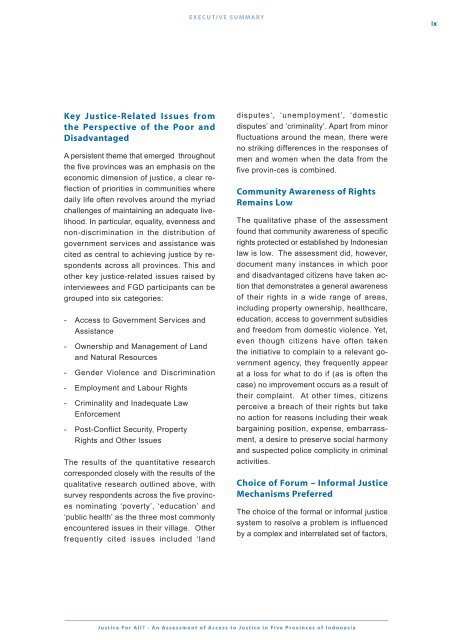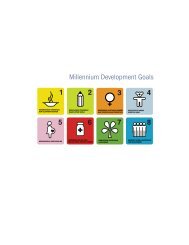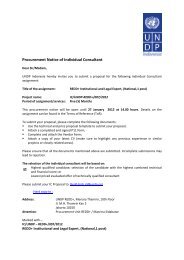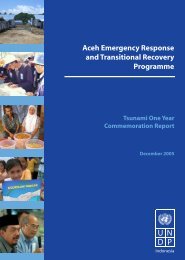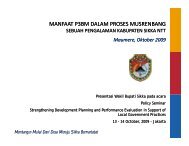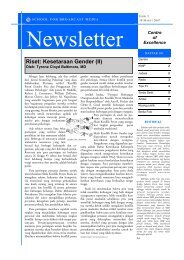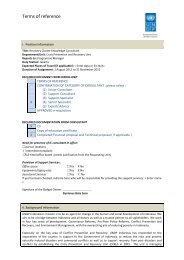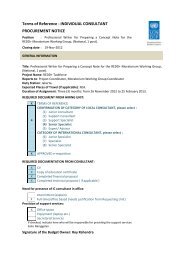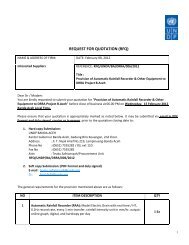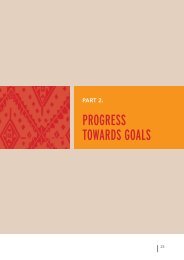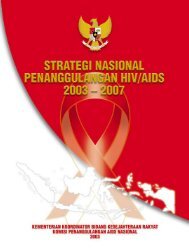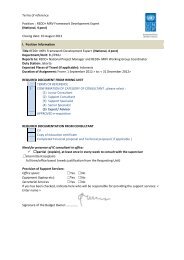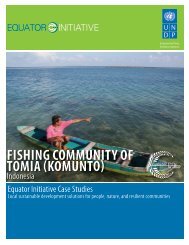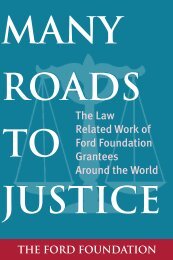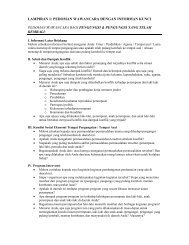- Page 1 and 2: PSPK-UGM Justice For All? An Assess
- Page 3 and 4: Justice For All? - An Assessment of
- Page 5 and 6: ii PREFACE Access to justice is a v
- Page 7 and 8: iv ACKNOWLEDGEMENTS The Law Faculti
- Page 9 and 10: vi ACKNOWLEDGEMENTS Justice For All
- Page 11: viii EXECUTIVE SUMMARY the establis
- Page 15 and 16: xii EXECUTIVE SUMMARY Prosecutors H
- Page 17 and 18: xiv EXECUTIVE SUMMARY erence for th
- Page 19 and 20: xvi Justice For All? - An Assessmen
- Page 21 and 22: xviii TABLE OF CONTENTS 3. FACTORS
- Page 23 and 24: xx TABLE OF CONTENTS 2. JUSTICE FRO
- Page 25 and 26: xxii TABLE OF CONTENTS Justice For
- Page 27 and 28: xxiv TABLE OF FIGURES Box 34: Viole
- Page 29 and 30: xxvi TABLE OF FIGURES CHARTS Chart
- Page 31 and 32: xxviii Justice For All? - An Assess
- Page 33 and 34: GLOSSARY xxx Dinas Perikanan Dusun
- Page 35 and 36: GLOSSARY xxxii Mahkamah Agung Mahka
- Page 37 and 38: GLOSSARY xxxiv RT - Rukun Tetangga
- Page 39 and 40: 002 INTRODUCTION PART 1 Justice For
- Page 41 and 42: 004 INTRODUCTION PART 1 prehensive,
- Page 43 and 44: 006 INTRODUCTION PART 1 The Normati
- Page 45 and 46: 008 INTRODUCTION PART 1 2. A NORMAT
- Page 47 and 48: 010 INTRODUCTION PART 1 Acara Pidan
- Page 49 and 50: 012 PART 1 The Commission does not
- Page 51 and 52: 014 INTRODUCTION PART 1 FIGURE 4: S
- Page 53 and 54: 016 INTRODUCTION PART 1 have first-
- Page 55 and 56: 018 INTRODUCTION PART 1 ‘hardship
- Page 57 and 58: INTRODUCTION 020 PART 1 regarding t
- Page 59 and 60: INTRODUCTION 022 PART 1 BOX 1: MAJO
- Page 61 and 62: INTRODUCTION 024 PART 1 most access
- Page 63 and 64:
INTRODUCTION 026 PART 1 passes a ne
- Page 65 and 66:
INTRODUCTION 028 PART 1 that ‘the
- Page 67 and 68:
INTRODUCTION 030 PART 1 West Kalima
- Page 69 and 70:
INTRODUCTION 032 PART 1 Key Develop
- Page 71 and 72:
INTRODUCTION 034 PART 1 of conflict
- Page 73 and 74:
INTRODUCTION 036 PART 1 Justice For
- Page 75 and 76:
038 PART 2 Justice For All? - An As
- Page 77 and 78:
040 FINDINGS PART 2 TABLE 3: A SELE
- Page 79 and 80:
042 FINDINGS PART 2 1.3 KEY JUSTICE
- Page 81 and 82:
044 FINDINGS PART 2 subsidised rice
- Page 83 and 84:
046 FINDINGS PART 2 An absence of c
- Page 85 and 86:
048 FINDINGS PART 2 BOX 5: A WORKPL
- Page 87 and 88:
050 FINDINGS PART 2 the cost of mai
- Page 89 and 90:
052 FINDINGS PART 2 legal awareness
- Page 91 and 92:
054 FINDINGS PART 2 local authoriti
- Page 93 and 94:
056 FINDINGS PART 2 spread support
- Page 95 and 96:
058 FINDINGS PART 2 Pro deo is not
- Page 97 and 98:
060 FINDINGS PART 2 Legal Aid Insti
- Page 99 and 100:
062 FINDINGS PART 2 as an advocate,
- Page 101 and 102:
064 FINDINGS PART 2 reaching its ta
- Page 103 and 104:
066 FINDINGS PART 2 rence for eithe
- Page 105 and 106:
068 FINDINGS PART 2 satisfaction wi
- Page 107 and 108:
070 FINDINGS PART 2 TABLE 6 : OVERA
- Page 109 and 110:
072 FINDINGS PART 2 mechanism is th
- Page 111 and 112:
074 FINDINGS PART 2 Southeast Sulaw
- Page 113 and 114:
076 FINDINGS PART 2 CHART 5: COMMUN
- Page 115 and 116:
078 FINDINGS PART 2 Of greater conc
- Page 117 and 118:
080 FINDINGS PART 2 TABLE 9: SOCIAL
- Page 119 and 120:
082 FINDINGS PART 2 and with limite
- Page 121 and 122:
084 FINDINGS PART 2 to citizen rati
- Page 123 and 124:
086 FINDINGS PART 2 because he had
- Page 125 and 126:
088 FINDINGS PART 2 is an open secr
- Page 127 and 128:
090 FINDINGS PART 2 carry out their
- Page 129 and 130:
092 FINDINGS PART 2 it was soon due
- Page 131 and 132:
094 FINDINGS PART 2 Low Salaries: T
- Page 133 and 134:
096 PART 2 shortage of official car
- Page 135 and 136:
098 FINDINGS PART 2 Divorce Cases M
- Page 137 and 138:
100 FINDINGS PART 2 Traditional hal
- Page 139 and 140:
102 FINDINGS PART 2 Submission to t
- Page 141 and 142:
104 FINDINGS PART 2 hardly be said
- Page 143 and 144:
106 FINDINGS PART 2 courts and in a
- Page 145 and 146:
108 FINDINGS PART 2 Justice For All
- Page 147 and 148:
110 PART 3 Justice For All? - An As
- Page 149 and 150:
112 CONCLUSIONS & RECOMMENDATIONS P
- Page 151 and 152:
114 CONCLUSIONS & RECOMMENDATIONS P
- Page 153 and 154:
116 CONCLUSIONS & RECOMMENDATIONS P
- Page 155 and 156:
118 CONCLUSIONS & RECOMMENDATIONS P
- Page 157 and 158:
120 CONCLUSIONS & RECOMMENDATIONS P
- Page 159 and 160:
122 CONCLUSIONS & RECOMMENDATIONS P
- Page 161 and 162:
124 ANNEX 1 Justice For All? - An A
- Page 163 and 164:
126 SURVEY DEMOGRAPHICS ANNEX 1 per
- Page 165 and 166:
128 BIBLIOGRAPHY BIBLIOGRAPHY Austr
- Page 167 and 168:
130 BIBLIOGRAPHY BIBLIOGRAPHY Coord
- Page 169 and 170:
132 BIBLIOGRAPHY BIBLIOGRAPHY Hukum
- Page 171 and 172:
134 BIBLIOGRAPHY BIBLIOGRAPHY Linds
- Page 173 and 174:
136 BIBLIOGRAPHY BIBLIOGRAPHY Stati
- Page 175 and 176:
138 BIBLIOGRAPHY BIBLIOGRAPHY World
- Page 177 and 178:
140 BIBLIOGRAPHY BIBLIOGRAPHY Chief
- Page 179 and 180:
142 WEST KALIMANTAN PROVINCIAL REPO
- Page 181 and 182:
144 WEST KALIMANTAN PROVINCIAL REPO
- Page 183 and 184:
146 WEST KALIMANTAN PROVINCIAL REPO
- Page 185 and 186:
148 WEST KALIMANTAN PROVINCIAL REPO
- Page 187 and 188:
150 WEST KALIMANTAN PROVINCIAL REPO
- Page 189 and 190:
152 WEST KALIMANTAN PROVINCIAL REPO
- Page 191 and 192:
154 WEST KALIMANTAN PROVINCIAL REPO
- Page 193 and 194:
156 WEST KALIMANTAN PROVINCIAL REPO
- Page 195 and 196:
158 WEST KALIMANTAN PROVINCIAL REPO
- Page 197 and 198:
160 WEST KALIMANTAN PROVINCIAL REPO
- Page 199 and 200:
162 WEST KALIMANTAN PROVINCIAL REPO
- Page 201 and 202:
164 WEST KALIMANTAN PROVINCIAL REPO
- Page 203 and 204:
166 WEST KALIMANTAN PROVINCIAL REPO
- Page 205 and 206:
168 WEST KALIMANTAN PROVINCIAL REPO
- Page 207 and 208:
170 WEST KALIMANTAN PROVINCIAL REPO
- Page 209 and 210:
172 WEST KALIMANTAN PROVINCIAL REPO
- Page 211 and 212:
174 WEST KALIMANTAN PROVINCIAL REPO
- Page 213 and 214:
176 WEST KALIMANTAN PROVINCIAL REPO
- Page 215 and 216:
178 WEST KALIMANTAN PROVINCIAL REPO
- Page 217 and 218:
180 WEST KALIMANTAN PROVINCIAL REPO
- Page 219 and 220:
182 WEST KALIMANTAN PROVINCIAL REPO
- Page 221 and 222:
184 WEST KALIMANTAN PROVINCIAL REPO
- Page 223 and 224:
186 MALUKU PROVINCIAL REPORT ANNEX
- Page 225 and 226:
188 MALUKU PROVINCIAL REPORT ANNEX
- Page 227 and 228:
190 MALUKU PROVINCIAL REPORT ANNEX
- Page 229 and 230:
192 MALUKU PROVINCIAL REPORT ANNEX
- Page 231 and 232:
194 MALUKU PROVINCIAL REPORT ANNEX
- Page 233 and 234:
196 MALUKU PROVINCIAL REPORT ANNEX
- Page 235 and 236:
198 MALUKU PROVINCIAL REPORT ANNEX
- Page 237 and 238:
200 MALUKU PROVINCIAL REPORT ANNEX
- Page 239 and 240:
202 MALUKU PROVINCIAL REPORT ANNEX
- Page 241 and 242:
204 MALUKU PROVINCIAL REPORT ANNEX
- Page 243 and 244:
206 MALUKU PROVINCIAL REPORT ANNEX
- Page 245 and 246:
208 MALUKU PROVINCIAL REPORT ANNEX
- Page 247 and 248:
210 MALUKU PROVINCIAL REPORT ANNEX
- Page 249 and 250:
212 MALUKU PROVINCIAL REPORT ANNEX
- Page 251 and 252:
214 MALUKU PROVINCIAL REPORT ANNEX
- Page 253 and 254:
216 MALUKU PROVINCIAL REPORT ANNEX
- Page 255 and 256:
218 MALUKU PROVINCIAL REPORT ANNEX
- Page 257 and 258:
220 MALUKU PROVINCIAL REPORT ANNEX
- Page 259 and 260:
222 MALUKU PROVINCIAL REPORT ANNEX
- Page 261 and 262:
224 MALUKU PROVINCIAL REPORT ANNEX
- Page 263 and 264:
226 MALUKU PROVINCIAL REPORT ANNEX
- Page 265 and 266:
228 MALUKU PROVINCIAL REPORT ANNEX
- Page 267 and 268:
230 MALUKU PROVINCIAL REPORT ANNEX
- Page 269 and 270:
232 MALUKU PROVINCIAL REPORT ANNEX
- Page 271 and 272:
234 NORTH MALUKU PROVINCIAL REPORT
- Page 273 and 274:
236 NORTH MALUKU PROVINCIAL REPORT
- Page 275 and 276:
238 NORTH MALUKU PROVINCIAL REPORT
- Page 277 and 278:
240 NORTH MALUKU PROVINCIAL REPORT
- Page 279 and 280:
242 NORTH MALUKU PROVINCIAL REPORT
- Page 281 and 282:
244 NORTH MALUKU PROVINCIAL REPORT
- Page 283 and 284:
246 NORTH MALUKU PROVINCIAL REPORT
- Page 285 and 286:
248 NORTH MALUKU PROVINCIAL REPORT
- Page 287 and 288:
250 NORTH MALUKU PROVINCIAL REPORT
- Page 289 and 290:
252 NORTH MALUKU PROVINCIAL REPORT
- Page 291 and 292:
254 NORTH MALUKU PROVINCIAL REPORT
- Page 293 and 294:
256 NORTH MALUKU PROVINCIAL REPORT
- Page 295 and 296:
258 NORTH MALUKU PROVINCIAL REPORT
- Page 297 and 298:
260 NORTH MALUKU PROVINCIAL REPORT
- Page 299 and 300:
262 NORTH MALUKU PROVINCIAL REPORT
- Page 301 and 302:
264 NORTH MALUKU PROVINCIAL REPORT
- Page 303 and 304:
266 NORTH MALUKU PROVINCIAL REPORT
- Page 305 and 306:
268 NORTH MALUKU PROVINCIAL REPORT
- Page 307 and 308:
270 NORTH MALUKU PROVINCIAL REPORT
- Page 309 and 310:
272 NORTH MALUKU PROVINCIAL REPORT
- Page 311 and 312:
274 ANNEX 5 Justice For All? - An A
- Page 313 and 314:
276 CENTRAL SULAWESI PROVINCIAL REP
- Page 315 and 316:
278 CENTRAL SULAWESI PROVINCIAL REP
- Page 317 and 318:
280 CENTRAL SULAWESI PROVINCIAL REP
- Page 319 and 320:
282 CENTRAL SULAWESI PROVINCIAL REP
- Page 321 and 322:
284 CENTRAL SULAWESI PROVINCIAL REP
- Page 323 and 324:
286 CENTRAL SULAWESI PROVINCIAL REP
- Page 325 and 326:
288 CENTRAL SULAWESI PROVINCIAL REP
- Page 327 and 328:
290 CENTRAL SULAWESI PROVINCIAL REP
- Page 329 and 330:
292 CENTRAL SULAWESI PROVINCIAL REP
- Page 331 and 332:
294 CENTRAL SULAWESI PROVINCIAL REP
- Page 333 and 334:
296 ANNEX 5 4.2 PATTERNS OF USE IN
- Page 335 and 336:
298 CENTRAL SULAWESI PROVINCIAL REP
- Page 337 and 338:
300 CENTRAL SULAWESI PROVINCIAL REP
- Page 339 and 340:
302 CENTRAL SULAWESI PROVINCIAL REP
- Page 341 and 342:
304 CENTRAL SULAWESI PROVINCIAL REP
- Page 343 and 344:
306 CENTRAL SULAWESI PROVINCIAL REP
- Page 345 and 346:
308 CENTRAL SULAWESI PROVINCIAL REP
- Page 347 and 348:
310 CENTRAL SULAWESI PROVINCIAL REP
- Page 349 and 350:
312 CENTRAL SULAWESI PROVINCIAL REP
- Page 351 and 352:
314 CENTRAL SULAWESI PROVINCIAL REP
- Page 353 and 354:
316 CENTRAL SULAWESI PROVINCIAL REP
- Page 355 and 356:
318 SOUTHEAST SULAWESI PROVINCIAL R
- Page 357 and 358:
320 SOUTHEAST SULAWESI PROVINCIAL R
- Page 359 and 360:
322 SOUTHEAST SULAWESI PROVINCIAL R
- Page 361 and 362:
324 SOUTHEAST SULAWESI PROVINCIAL R
- Page 363 and 364:
326 SOUTHEAST SULAWESI PROVINCIAL R
- Page 365 and 366:
328 SOUTHEAST SULAWESI PROVINCIAL R
- Page 367 and 368:
330 SOUTHEAST SULAWESI PROVINCIAL R
- Page 369 and 370:
332 SOUTHEAST SULAWESI PROVINCIAL R
- Page 371 and 372:
334 SOUTHEAST SULAWESI PROVINCIAL R
- Page 373 and 374:
336 SOUTHEAST SULAWESI PROVINCIAL R
- Page 375 and 376:
338 SOUTHEAST SULAWESI PROVINCIAL R
- Page 377 and 378:
340 SOUTHEAST SULAWESI PROVINCIAL R
- Page 379 and 380:
342 SOUTHEAST SULAWESI PROVINCIAL R
- Page 381 and 382:
344 SOUTHEAST SULAWESI PROVINCIAL R
- Page 383 and 384:
346 SOUTHEAST SULAWESI PROVINCIAL R
- Page 385 and 386:
348 SOUTHEAST SULAWESI PROVINCIAL R
- Page 387 and 388:
350 SOUTHEAST SULAWESI PROVINCIAL R
- Page 389 and 390:
352 SOUTHEAST SULAWESI PROVINCIAL R
- Page 391 and 392:
354 SOUTHEAST SULAWESI PROVINCIAL R
- Page 393:
356 SOUTHEAST SULAWESI PROVINCIAL R


